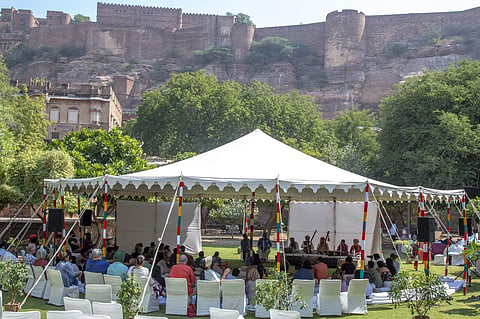
- LIFESTYLE
- FASHION
- FOOD
- ENTERTAINMENT
- EVENTS
- CULTURE
- VIDEOS
- WEB STORIES
- GALLERIES
- GADGETS
- CAR & BIKE
- SOCIETY
- TRAVEL
- NORTH EAST
- INDULGE CONNECT

A light drizzle greeted Rajasthani artiste Dapu Khan as he sang a monsoon song while playing his native bowed instrument, the kamaicha. Luckily for roots music aficionados, this living legend was not spotted in some remote village. Instead, he was seated within the majestic Mehran Fort, performing at the Rajasthan International Folk Festival (RIFF), surrounded by a global audience.
If you are about to shrug off folk music as a remnant of the old world, there is more to the 11-year-old Jodhpur RIFF festival than meets the eye. “Our core commitment is towards local communities such as Manganiyars and Langas but we also showcase musicians from across the world—what’s important is the roots connection,” says the festival director Divya Bhatia, speaking about hand-picking artistes from across continents; Australia to Europe and beyond.
In a time when marking regional identities have become important in the cultural sphere, we engaged a few performers in conversations on the importance of spaces like Jodhpur RIFF and how it inspires youngsters to reinterpret traditions.
Bringing together
The most prominent interpretation of roots music at the fete was collaborations. “Personally, I am astounded by the beauty of folk melodies. Sometimes when people ask if I want to do something new, I reply there is so much old to delve into. I merely add new perspectives through subtleties,” says Grammy-winning South African flautist Wouter Kellerman, who returned to the festival after his primary association with Rajasthani performers three years ago.
Though Indian contemporary musicians are hardly visible in such mutually beneficial alliances, producers like Australian Gene Peterson have made best of this platform. He took up the challenging role of curating the finale event, which involved a mashup with Manganiyar musicians and impromptu sessions with acts from countries including Réunion and Spain.
“We explored each others’ music styles to find common grounds. Then, we took folk tunes and gave them a spin with hip-hop elements or figured how to orchestrate our western compositions with native instruments,” says Gene, who is keen to travel the world with the nascent project.
Unexpected maneuvers
The fluidity of traditional music to fit the structures of uber-urban styles was also evident in certain projects. Known for his versatile work in rock, jazz and experimental ensembles, Iranian singer-songwriter Makan Ashgvari’s appearance at RIFF paired Farsi singing and a Persian string instrument tar (which is hardly used in contemporary contexts) with a guitar.
“Going back to roots is not merely an option; your roots will naturally show through. However, your sound will also absorb the urban environment you grew up in,” says Makhan, on his act of altering Iranian literature and songs to express the modern living experience.
A very unanticipated presence at the fete was Los Angeles-based DJ Jose Marquez. “I grew up listening to a lot of Latin American melodies, and African percussion always captivated my attention. In the club, I mix up these influences with uptempo dance music and a younger audience worldwide have embraced the sound,” says Jose, who has travelled to places such as Singapore and China playing the sub-genre called Afro-Latin house.
Mixing electronic sounds with live recorded percussion, his idea of ‘virtual collaborations’ across the world, using the internet, is indeed inspiring.
New voices
Strangely enough, RIFF also had narratives which offered a fresh perspective on distant lands. Renowned for their ‘darker, stranger Australian folk’ tunes, Bush Gothic had different tales from the continent than the much familiar ones on Aboriginal oppression.
“Parts of Australia were once penal colonies where people now live cut off from their parent cultures and I believe that there is a need to reconnect. Our songs deal with topics like immigration, separation and even xenophobia which are universal,” says vocalist Jenny M Thomas, who is of Irish descent.
Mohammed Muneem, the main man behind the rock band Alif, also had distinct stories to share which shine a new light on growing up in a strife-ridden Kashmir. His tunes offer perspectives on the identity of being a Kashmiri and also a cosmopolitan millennial.
“Alif means standing united. We are all distinct and that is necessary for adding colour, but we should learn to respect diversity,” says Mohammed, asserting that coming together for an honest celebration of one’s own roots can dismiss each other’s differences.
The writer was at Jodhpur RIFF upon invitation